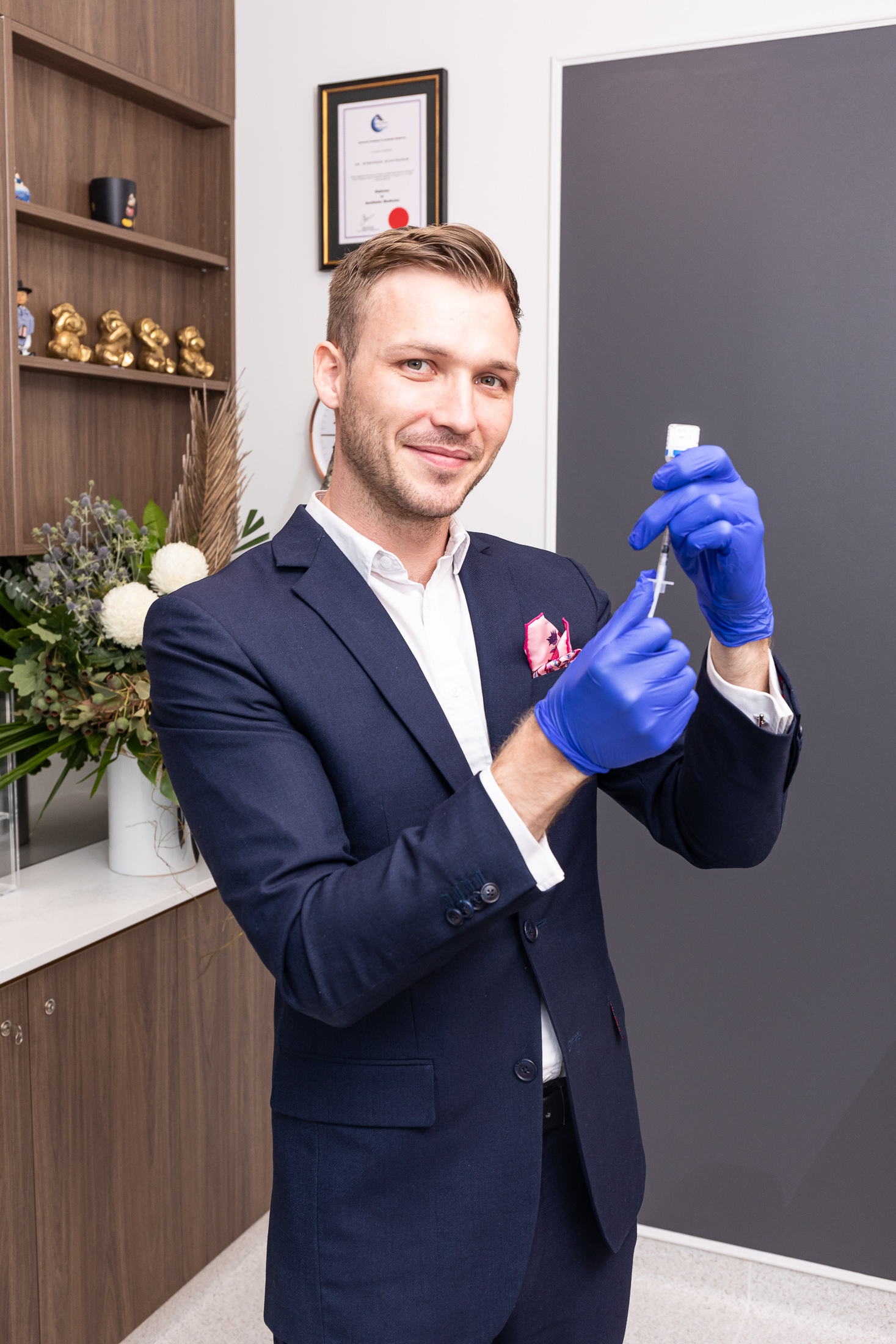Liquid facelifts are becoming a popular non-surgical alternative to a traditional facelift. As we age, the skin on our face naturally becomes thinner and less elastic. The production of collagen, a protein that helps keep skin smooth and elastic, slows down. The skin also becomes drier and less able to retain moisture. As a result, fine lines and wrinkles may start to appear, and existing wrinkles may become more prominent.
The skin on our face will also start to sag as it becomes thinner, and gravity can also play a role in sagging skin, as it can pull the skin downward over time. In addition, the loss of fat in the face that occurs naturally with ageing can also contribute to sagging skin.
Sagging skin can be more pronounced in some people than in others and may be more noticeable in certain areas of the face, such as the cheeks, jawline, and neck.
Understanding a Liquid Facelift
What is a liquid facelift?
A liquid facelift is a non-surgical treatment designed to improve the appearance of sagging skin. With age, your face loses bone and deep fat (volume), collagen, and skin becomes redundant. The combination of these changes gives the appearance of sagging.
Primarily using dermal fillers to enhance volume, a liquid facelift restores structure to areas of volume loss, and camouflages areas of sagging skin.
It can be used to improve sagging around your brows, eyelids, cheeks, nose, mouth, and jawline.
How does a liquid facelift work?
A liquid facelift is a non-surgical cosmetic procedure that is designed to lift and tighten the skin on the face and neck to create a more youthful appearance. It typically involves the use of injectable treatments, such as dermal fillers, anti-wrinkle injections and collagen stimulating injections, to improve the appearance of fine lines, wrinkles, and sagging skin. The procedure is called a “liquid facelift” because it uses injectable treatments rather than surgery to lift and tighten the skin.
A liquid facelift is far less invasive than a traditional facelift, which is a surgical procedure that involves making incisions in the skin and tightening the underlying muscles and tissues. A liquid facelift does not require any incisions or downtime, and the results are typically more subtle than those of a traditional facelift. However, the effects of a liquid facelift are usually temporary and will need to be repeated in order to maintain the desired results.
How does a liquid facelift differ from a traditional facelift?
A liquid facelift is a non-surgical procedure that uses dermal fillers to add volume, smooth wrinkles, and subtly contour the face. It is quick, has no downtime and is ideal for mild to moderate sagging skin. The results are also reversible giving your flexibility over your appearance.
In contrast, a traditional facelift is a surgical procedure that physically lifts and tightens the skin, offering more dramatic and long-lasting results, typically lasting 5-10 years. However, it requires a longer recovery period and comes with more risks.
Is a liquid facelift a non-surgical procedure?
What areas can a liquid facelift treat?
A non-surgical liquid facelift is most commonly used to treat common signs of ageing including:
- Under eye hollows
- Sagging eyebrows
- Hollow cheeks
- Sagging jowls
- Hollow temples
- Nasolabial folds
- Marionette folds
- Receding chin
- Shrinking jawline
- Crow’s feet
- Frown lines
What types of facelifts are the least invasive?
Should I have a liquid non-surgical facelift or a surgical one?
When considering whether to proceed with a non-surgical liquid facelift or a traditional surgical facelift, you should consider the following:
- Your budget: A liquid facelift will generally cost $2000-$3000 on average, while a surgical facelift can cost over $25 000.
- Your tolerance for risk: Facelift surgery has more significant risks involved, both in regards to the surgery and the general anaesthetic. A liquid facelift is much lower risk, but does come with its own unique side effects.
- Your tolerance for downtime: If you cannot take time off work, or others depend on you to look after them, then facelift surgery may not fit in with your current situation.
- You expectations of a result: If you want a dramatic result, then surgery will be required. However, remember, that with surgery often comes scars, which are typically positioned in front of the ears with a facelift. A liquid facelift is ideal for those wanting a more subtle result.
Both a liquid facelift and a surgical facelift can complement one another, and it doesn’t significantly matter which comes first.
A liquid facelift is a great option for people looking to wind back the clock and improve sagging skin with a convenient, no downtime treatment that only takes 20-30 minutes to complete.
Is a liquid facelift better than a surgical facelift?
What are the common injectable fillers used in a liquid facelift?
Where is dermal filler injected during a liquid facelift procedure?
Costs & Procedure of Liquid Facelift
What is involved in a liquid facelift?
During the procedure, a healthcare provider will inject the chosen injectable treatments into specific areas of the face and neck. The injections are typically given using a very fine needle or a blunt instrument known as a cannula and take only a few minutes to administer. The amount and type of injectable treatments used will depend on the specific concerns and goals of the individual patient.
What treatments are used in a liquid facelift?
There are several injectable treatments that may be used in a liquid facelift, including:
- Anti-wrinkle injections: Anti-wrinkle product is a neuromodulator that is injected into the muscles of the face to relax them and reduce the appearance of wrinkles and fine lines. This is most effective for forehead lines, frown lines, crow’s feet and lip lines.
- Dermal fillers: Dermal fillers are injectable gels that are used to add volume and smooth out wrinkles and folds in the skin. There are many different types of dermal fillers available, each with its own unique properties and indications. They are great at restoring volume lost with age, contouring sagging facial skin and correcting hollow areas of the face such as the under eyes.
- Collagen stimulating injections: Also known as collagen injections, these are used to add volume to the face and stimulate collagen production. It can be used to improve the appearance of sagging skin and wrinkles, and restore more youthful contours and shape to your face. It can also improve the quality of your facial skin, giving it more tone and elasticity.
- Fat dissolving injections: Also known as Kybella, this is an injectable treatment that is used to reduce the appearance of a double chin by breaking down fat cells. It is made of a substance based on the naturally occurring compound deoxycholic acid, found in the body that helps to break down and absorb fat.
The specific injectable treatments used in a liquid facelift will depend on the individual patient’s concerns and goals.



